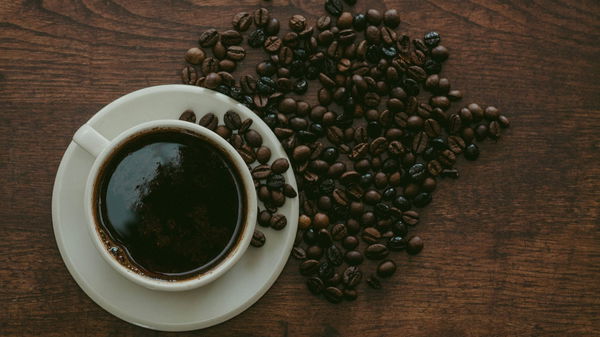

As people’s lives get busier, many resort to dieting to lose weight. However, the popularity of diet culture has also birthed what experts call ‘fad‘ diets. These diets often make lofty claims of rapid weight loss, yet only manage to provide temporary results at best. So, is the relatively new coffee diet any good? Or is it a fad?
Watch What’s Trending Now!
The coffee diet originated from The Coffee Lover’s Diet, a book by Dr. Bob Arnot. Dr. Arnot wrote his 2017 book after studying the population of Ikaria, a small island in Greece. He observed that a large portion of the population are healthy elderly people. Arnot connected their health and longevity to coffee consumption and explained why in his book.
ADVERTISEMENT
Article continues below this ad
What is the coffee diet?
Dr. Bob Arnot laid the foundation for using coffee as a weight loss tool. The author wrote that drinking several cups of coffee may have several benefits that assist with weight loss. Dirking at least three cups (720 ml), preferably more, boosts metabolism, suppresses appetite, blocks calorie absorption, and burns more fat.
ADVERTISEMENT
Article continues below this ad

The coffee diet takes it one step further by including increased coffee consumption and introducing calorie restrictions. While coffee plays a central role in Dr. Arnot’s diet plan, he also recommends eating only 1500 calories a day to maximize weight loss. The average adult consumes around 1800 to 2000 calories.
So the 1500-calorie meal plan coupled with at least 720 ml of coffee per day might make the diet hard to follow for some people. Despite eating fewer calories, the author banks on coffee’s appetite suppression properties to control hunger. The diet also relies on the metabolism and fat-burning boost to reduce weight faster than unusual.
ADVERTISEMENT
Article continues below this ad
The Coffee diet also involves removing one meal and replacing it with a homemade high-fiber smoothie. Fiber also helps regulate appetite and may also help improve digestion. However, the weight loss diet plan is quite particular about the type of coffee you consume.
What type of coffee works best for weight loss?
While those who decide to start the coffee diet plan have to drink a lot of it, they can’t guzzle down their favorite latte or cafe mocha. Dr. Arnot recommends drinking unsweetened coffee made from light roasted whole beans fresh ground at home. Fresh ground light roast coffee contains more anti-oxidants than darker roasts.

The author also believes that consuming high amounts of these anti-oxidants called polyphenols from coffee was part of the secret to the health of the Ikaria natives. So, while drinking espressos, americanos are preferred. Unsweetened cappuccino or lattes will do as well. However, adding sugar in any form is not recommended.
Instant coffee and even decaf may not be optimal because the processing may reduce the beneficial polyphenols. On the surface, the coffee diet seems ideal for increasing the rate of weight loss as well as fortifying your health. Besides the benefits of anti-oxidants from coffee, ample fiber and clean eating would seem to improve gut health.
However, is the coffee diet truly as good as it seems on paper? Bodybuilding legend Arnold Schwarzenegger says a good weight loss diet is a sustainable one. Yet, does the coffee diet hold up to closer scrutiny?
Is it a sustainable weight loss diet?
Unfortunately, the Coffee diet has significant downsides. The first one is the lack of scientific evidence. Research shows that coffee suppresses appetite only for a short time. Hence, drinking coffee shortly before a meal may help you eat less. However, coffee doesn’t reduce appetite when consumed three or four hours before a meal.
While studies show more favorable outcomes on coffee’s effects on metabolism, these studies were performed on just a few participants. One of the larger studies on 600 participants showed those who drank coffee had lower BMI, fat mass, and body weight. Those who doubled their caffeine intake saw a further 17% reduction.
An even smaller study on 7 men who regularly trained in the gym for 30 minutes and drank coffee burned more fat than those who drank water. However, these studies were done in the 80s and 90s, there is a lack of large-scale studies. However, significantly increasing caffeine intake gives rise to the second downside of the weight loss diet.

While new research continues to find multiple benefits of drinking coffee, it’s easy to overdose on caffeine. Let’s take your average pre-workout as an example. Those who use pre-workouts often deplete their daily safe allowance of 400 mg per day with a single dose. Freshly ground coffee contains somewhere from 70-140mg of caffeine.
Depending on how much coffee you use for a cup, it’s easy to cross the safe limit with just four cups. Increasing caffeine intake may also cause digestion issues in many people, and it’s one of the reasons why many prefer decaf. The third issue is regaining the weight once you stop the coffee diet.
While the diet plan may increase your weight loss rate, it depends on appetite suppression and calorie reduction. So, once you stop the diet, not only will your calories shoot upward, but the appetite suppression element in your diet will also go away. Unfortunately, the diet is also unsustainable for long periods.
Drinking a lot of coffee for weight loss over a prolonged period may cause insomnia and depression. If you drink coffee late in the evening, the caffeine is bound to mess up your sleep cycle. In conclusion, it’s safe to say that the coffee diet may help you lose weight, but it has risks and isn’t sustainable.
ADVERTISEMENT
ADVERTISEMENT
ADVERTISEMENT
ADVERTISEMENT


